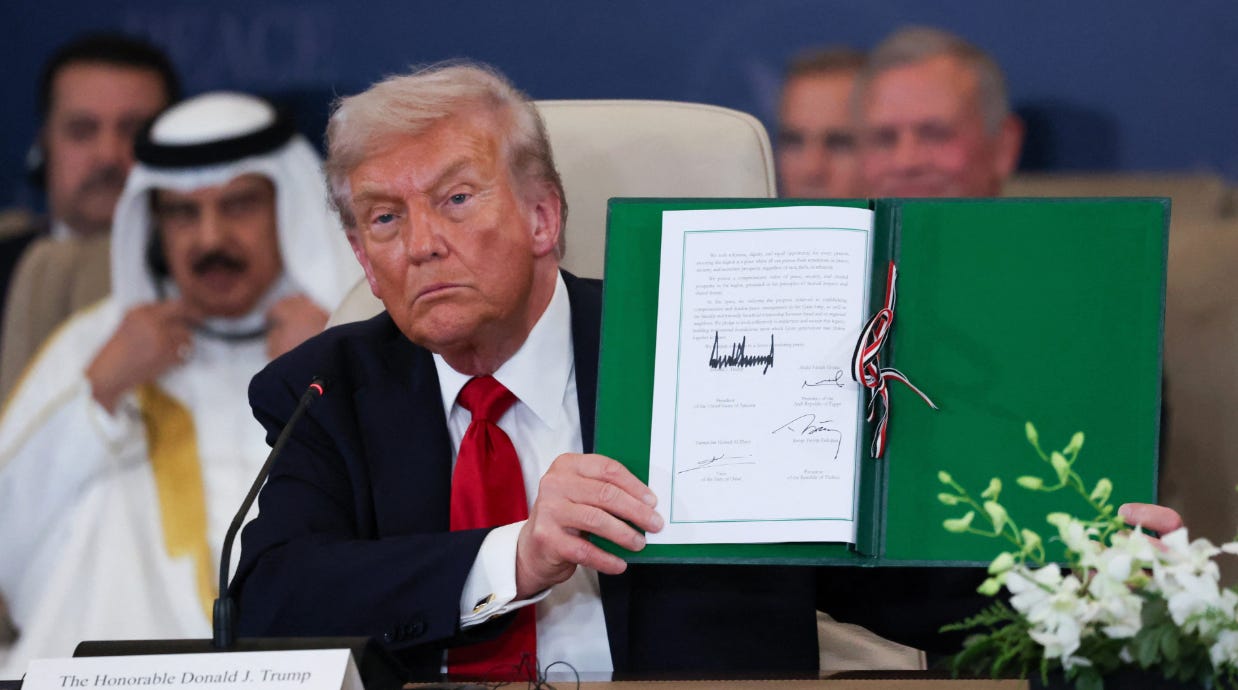Welcome to the desert of the real!
If you desire the comfort of neat conclusions, you are lost in this space. Here, we indulge in the unsettling, the excessive, the paradoxes that define our existence.
So, if you have the means and value writing that both enriches and disturbs, please consider becoming a paid subscriber.
Comparisons between Trump’s peace efforts and Chamberlain’s proclamation in 1938 that his Munich agreement with Hitler achieved a “peace for our time” were repeated again and again after the meeting of Trump and Putin in Alaska, with the idea that the peace Trump wanted to impose on Ukraine would effectively amount to Ukraine’s capitulation to Russia. In a similar way, Trump’s claim that he has already ended eight wars is ridiculed. However, I think that Trump’s peace efforts should not be dismissed as a ridiculous fake: his mixture of diplomatic activity and the use of brutal military and economic force to stop a war is effectively a model of “peace for our time,” a model of how (economic and military) wars could be and will be ended in our era. After Taylor Swift’s triumphant Eras Tour, we now see an equally triumphant Trump peace tour all around the world.
There were two big news stories about Donald Trump in October 2025. The first concerns the trade war between the US and China; the second is Trump’s success in imposing a ceasefire in the Middle East war, an act that will strengthen his image as a global peacemaker. These two acts seem to point in opposite directions: Trump as a global peacemaker versus Trump engaged in brutal economic warfare. My claim is that there is no essential difference between the two: in both cases, Trump is acting in exactly the same way.
Let’s begin with the first act: Trump announced he will impose an additional 100% tariff on goods from China, on top of the 30% tariffs already in effect, starting November 1 or sooner. The threat is a massive escalation after months of a trade truce between the two nations. Trump’s announcement is tied to Beijing ramping up export controls on its critical rare earths, which are needed to produce many electronics. Markets closed sharply lower on Friday after Trump’s initial comments, with the Dow falling by 878 points, or 1.9%. The S&P 500 was down 2.7%, and the tech-heavy Nasdaq tumbled 3.5%.1 Was this just a strategic provocation, an excessive decision meant to strengthen the position of the US in future negotiations? I suspect Trump himself isn’t sure about it – he will see how the situation develops. A sudden and unexpected volte-face is one of Trump’s trademarks, not to mention his advocacy of inconsistent political moves: after advising the EU to aggressively reply to the incursion of Russian drones, he moves to a renewed friendly dialogue with Putin. If one brings this logic to the extreme, one can well imagine a local war between the EU and Russia in Eastern Europe while the construction of a direct undersea rail link between Russia and the US goes on. Trump now provides more arms to Ukraine, but (as he likes to point out) they are paid for by EU states. Trump does business like war, and war like business.
A detail from the short open conflict between the US and Iran tells it all. Iran fired retaliatory strikes against the U.S. on June 22, 2025, targeting an American military base in Qatar with, officials say, the same number of missiles the U.S. dropped on Iran during its unprovoked attack a day earlier. The US reaction? Trump said that Iranian officials provided the U.S. with advance notice of the strike. He struck an optimistic tone in a post on Truth Social shortly after—in sharp contrast to his comments on Saturday threatening more strikes on Iran, and his comments on Monday morning suggesting he wants regime change in Iran. Trump called the strikes “very weak” and thanked Iran for giving notice. He appeared to insinuate that the tit-for-tat strikes between the U.S. and Iran were over. “I am pleased to report that NO Americans were harmed, and hardly any damage was done. Most importantly, they’ve gotten it all out of their ‘system,’ and there will, hopefully, be no further HATE. I want to thank Iran for giving us early notice, which made it possible for no lives to be lost, and nobody to be injured,” said Trump.2 This reaction also displays an awareness that if one wants peace, one should give the enemy a chance to save face; yet, there is also a hidden humiliation in it: such public gratitude, if performed, annihilates the dimension of saving the enemy’s face.
Keep reading with a 7-day free trial
Subscribe to ŽIŽEK GOADS AND PRODS to keep reading this post and get 7 days of free access to the full post archives.


